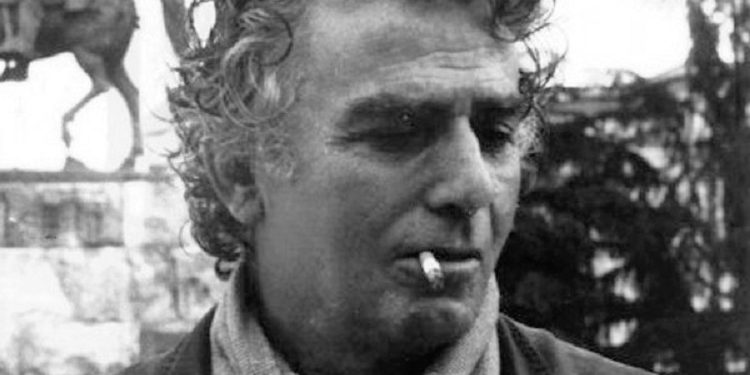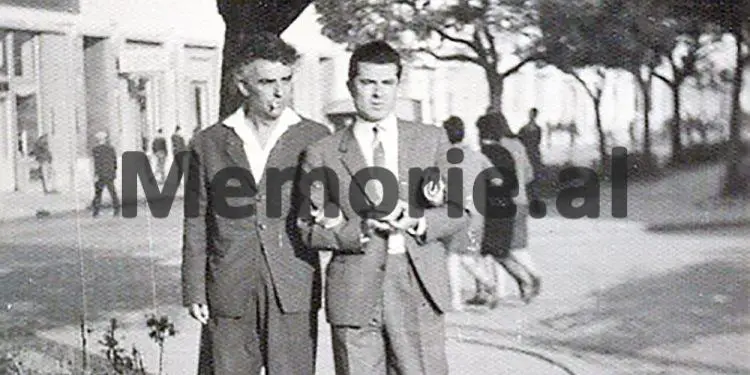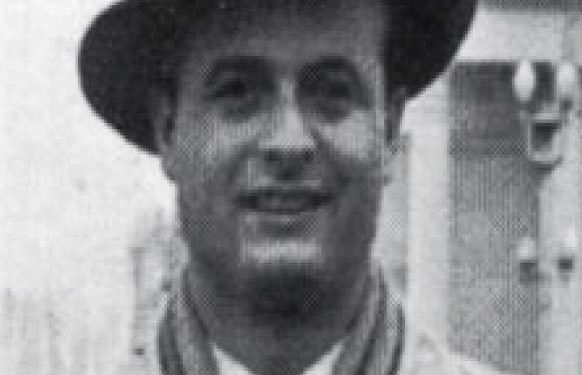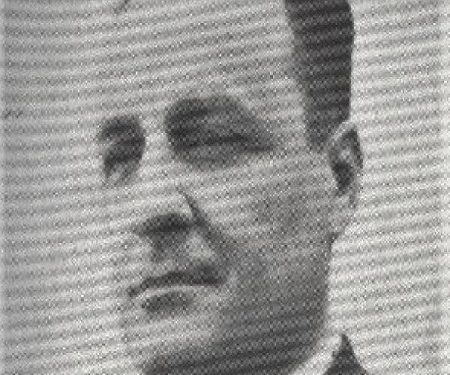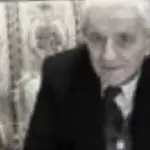By Petro Marko
The fifth part
Memorie.al / The confessions of the well-known writer Petro Marko, former fighter of the Internationalist Brigades in the War of Spain in 1936, and then also of the anti-fascist resistance in Tirana, shows the behind-the-scenes of what is known as the National Liberation War and why Koçi Xoxe hated Enver Hoxha?! Sejfulla Maleshova’s order: “This is a terrorist party; don’t open your mouth, because you will suffer…”! Why was Petro Marko sentenced and who were those who prepared his arrest and who helped him after leaving prison, etc. Selected parts from the book “Interview with myself”, by the well-known Albanian writer Petro Marko, published in the early 90s after the fall of the communist regime, a book which had a great echo in the press of the time, after it was published and reprinted several times, and setting a sales record.
CALVARY BEGINS
UNDER THE HAZZY SUN OF MY RELEASE FROM PRISON
Surprisingly, in 1969 Inasuke Hazama, a well-known Japanese painter, who had been visiting Albania and I had given him my novel (Albanian of course) as a gift, sent me a package in Lăgă. In that package was the novel “The Last City”, divided into two volumes, published in Japanese. Also, there was a Japanese newspaper, in which the novel and I, as its author, were praised. I received a letter from the Japanese translator, who, surprisingly, knew Albanian very well, inviting me to Japan to meet and receive the reward for the novel. I went to the relevant institutions and of course I got what I expected: a negative answer. Thus, I could not even answer the distant Japanese, who praised my work so highly.
Of course, a writer never manages to write more than fifty percent of the works he dreamed of or planned. I still haven’t written even five percent of what I planned…! Many topics, but most of them international.
Question: – How did you feel yourself as a creator within the framework of the demands of the time?
Answer: – Under the dictatorship, after my imprisonment, with a severe three-year isolation, in the years that followed, the dream of realizing literary works was almost unattainable. Then I found the key and chose the topics dear to me: the brave wars of my people, for freedom, independence, and liberation.
So later, I wrote the novel “Halimi”, the novel “Season of Arms”, for which Safoja helped me with many materials, who had her partisan friends, such as Liri Arapi, etc., the novel “Ultimatum”, the novel ” Fields in the mountain”, the novel “A name in four roads”, which was made into a cartoon, but which I believe will now be published (as was the cartoon and the collection of my selected poems), the novel: “One night and two dawns “, which was not allowed to be published, remained for many years in my manuscripts. (In 1988, when I was again very ill, on the verge of death, Xhevahir Spahiu, after trying in high instances, I don’t know where, to give me the right to publish again, took this novel, he edited and reduced it himself, so that it could see the light of publication. I have the original unpublished. The title was adapted to the reduced edition: “The Night of Ustika”. This novel was named the best novel of the year and I, in my serious state of health, had great joy.)
In 1963, my best friend, the poet Drago Siliqi, at that time the director of the “Naim Frashëri” Publishing House, left for a visit to China and took with him the manuscript of the novel “One Night and Two Dawns” to he used to read in his spare time, to give the answer above as soon as possible. After a few days, Spiro Çomora took me on the phone and gave me unexpected, extremely bitter news: “Petro! The plane carrying Dragoja, returning from China, crashed in Irkutsk, on descent, above the airfield. And Spiroja, poisoned, told me that Dragoja had passed away. I hung up the phone, told Safo the sad news, that she also loved him very much, took a bench and went out to the balcony. I was crying like a child. I lost a dear friend again. Later, Drita, his wife, told me that in Drago’s bag, two small pairs of shoes were found, which were for his young daughters, and, among other things, were scattered around the airfield and the pages of my novel, which the attendees collected and brought to the family.
I wrote as a poet, as a journalist and as a writer, submitting as little as possible to the requirements and rules of creativity of the time, but I was harshly criticized, punished by the removal of the right to publish, and some of the works were cardboard, without going into circulation, thus denying me the joy of creation. For an artist, this is tantamount to death. This was another kind of imprisonment and isolation: silence. My name was removed from all the anthologies, textbooks, in the plenums of the League, I was never mentioned again and no press could talk about me, so worse than if I had died; I was indeed alive, breathing, seeing, thinking, hearing, judging, but in this kind of silence, I felt that I had been eliminated as a creator.
In 1974, a meeting was held at the Ministry of Education to expel me from the League. I was criticized for a poem that, by mistake, the pager had put as recent, and that poem was from the “Tears of the Exile” series: “Because the door of exile closed/ and now I will suffer/ My country today out of misery/ he will seem foreign to me/” and others… (Poems from the cycle “Lôte mergimtari”, written in Zhapion of Athens and kept for me by Dhimitër Shuteriqi, who may still have them today) . The Prime Minister was scandalized by this poem (it was said there: from the author’s last poems), so he called the Publishing Company and asked for an explanation: “When was this last poem by Petro Markos written?” The basic organization of the Party was quickly assembled and the discussion began. They talked and talked, and then an old “friend” of mine said: “Petroja has now written that poem”! This was reported to Mehmet, who became extremely angry, calling me crazy, and proposed that measures be taken against me.
The meeting was held at the Ministry of Education. It was chaired by my friend Mantho Bala. I was asked about that poem and I took it out of my pocket published in 1935: “The error is the pagers. Things that happen in printing presses…”!
Then they started to criticize the characters of the novel that became a cartoon: “A name in four roads”. They asked questions like this:
– Why did Corporal Rizon, commander of the gendarmerie in the village, who puts him in the game, did you do it from Kuçi?
I told them:
– Yes, Zogu did not take gendarmes and corporals from Denmark, but from our territories.
They talked and talked, as if I had committed some criminal act, then they gave me the floor, after they decided that I should be removed from the League of Writers and pay the costs of the voluminous publication of the novel “A Name in Four Roads”.
– I have no money to pay and nothing expensive, but my wife has a sewing machine. Take it and sell it…! Then I also want to say this: Why did you hold this meeting, exactly today, which is April 7th, and you didn’t do it yesterday, April 6th, or tomorrow, April 8th?! So this April 7 meeting has a political meaning. Maybe I will be accused of; I prepared it on April 7, 1939. – And I ran away without greeting anyone. They all looked like inquisitors to me. Yes, and they were not at fault. I was expelled from the League, I was stripped of my right to be a freelance writer and my right to publish for an indefinite period.
I also got rid of the veteran’s trisca. Insult after insult. (At the same time, measures were taken against the editor of the novel, my good friend, the poet Llazar Siliqi. As far as I remember, he was dismissed from the position of party secretary of the League of Writers) in the novel “A name in four roads”, for made an analogy with the time I lived, it seemed convenient that; to place events in the time of the Kingdom. And so I did. I mean, in this regard, that I blackened it more than it was then, for this purpose. But this was understood and the novel became a cartoon. For a possible reprint, I have left the relevant notes.
A note that I forgot to write before: In 1959, after I published “Hasta la vista”, which was very well received by readers (for years everyone greeted me on the street: “Hasta la vista”), the twentieth anniversary of the Revolution was being celebrated for the Defense of the Spanish Republic, from internal and external fascist aggressors. Then the Comintern called on the world proletariat to help the Spanish Republic with volunteers. All the countries that had sent volunteers to Spain had to publish a volume, for The Spanish War. The Central Committee took this order. They called me and gave me all the opportunities to publish such a book. So, they entrusted me with this task. I had memories of Luigi Longo, of the “Garibaldi” brigade “, I had a French edition and the “Freedom Volunteer”, which we published in Madrid.
I started from work and tasked all my friends to write a memoir about the Spanish war. Skënder Luarasi, Zef Prela, Mane Nishova, Mehmet Shehu, writes. Those of Justina Skopje and Iljaz Pasha, I prepared them, talking with them. Mehmet made the foreword and published his poem “Adelante, camaradas” there!
A few days after the publication, Mehmeti invited us for a picnic on the coast, at the pines near the Kavaja Rock. He ordered us not to take anything with us, because he would cover the expenses. We went to the pine hill and found a good place. It was a warm meeting, we took pictures and signed a copy of the book “The War of Spain”, each for the others, so that each copy that each received was signed by all of them. The proposal to give them the title of “People’s Hero” “, to those who fell in the Spanish War, I did it together with my friends; Skender, Manen, Zefi, Iliaz, Justina, motivating him like this: “Next to the 28 thousand martyrs of the Anti-Fascist National Liberation War, let them stand with pride also these five Albanian boys who gave their lives in the Anti-Fascist War in Spain”. The proposal was made to declare them “Heroes of the People”, and so it was done.
I regret to say: The term “adventurer”, for the warriors of Spain, circulated in some high social circles. This was the derogatory epithet, with which not only in my Motherland, but also in many countries of the world, freedom fighters, prominent anti-fascists, who participated in that war, were described. We heard it in France, and it continued to be whispered even when we returned to our homeland. When the dictatorship sued me, with other epithets, among them was the term “adventurer”! This was something that weighed on our souls, for all of us. It was known that it was done on purpose.
SCRIPT FOR THE FIRST ALBANIAN-SOVIET FILM
A film about our partisan war would be made, in cooperation with the Moscow Film Studio, and the screenwriter would be Albanian. We were divided into three groups: We finished the scripts, Kinostudio took they translated them into Russian, and when the famous director Çuhrai came to Tirana, with his group, they read all three scripts. They called us to the “Dajti” hotel, where Çuhrai was. I also took with me Zef Prela, my friend from Spain, who knew Russian.
When we got together, Çuhrai said: “We really liked the script of the writer Petro Marko, with the title “Red Snow”…! We will make an artistic film, so that it resonates, that it is an Albanian theme and written with art…”!
While Cuhrai was talking to some of the people present, he was looking into my eyes. And I looked at him, without understanding what was being said. We got up. Çuhrai told the director of Kinostudio: “We are leaving! We have no possibility to cooperate”! – And they came out. Zefi told me this. The next day, Çuhrai and his team left angrily, and the Moscow Cinema Studio sent us a team with another director. My script, strangely enough, was not discussed at all. Someone told me that; Çuhra was told, “The writer Petro Marko is not looked upon favorably by the Party, so don’t insist on his script”.
Outraged, I wrote a letter to the Prime Minister, expressing my indignation about the war being waged on art: “They wouldn’t say this is Petro Marko’s film, but they would say: Albanian film”!
The “Red Snow” script is still in Kinostudio, but no director came out to make it. It is more or less our struggle with the main character, the heroine Ms. Çurre, from Tragjasi, to whom I have also dedicated a beloved poem “Vajza e Labërija”. In a word, I felt that my creativity, step by step, ran into the barricades of people who did not show up. This hurt me a lot, because I thought about each work and put it on paper, with all the sincerity of my soul.
THE DRAMA OF A DRAMA
The 500th anniversary of Skanderbeg’s death would be commemorated. A spectacle had to be made. I had published in the magazine “Drita”, a story “Mountains, white mountains…”! Ramiz Alia called me to the apparatus of the Central Committee and said to me: “That story you published in “Drita”, about Skenderbeu, can you process it in the form of a drama, to be shown on this occasion?”
I told him I would try. At this time, we had received an order to go to the field, to get to know the reality. (This was a Chinese form.) I went to my village and decided to turn that story into a drama. I started from work. But in the meantime, I also went down to the gardens, where I worked with my good villagers, since then, they pruned the citrus trees, after they had released Iule, and they taught me how to see how many flowers a branch had, to remove the weak ones and I left the ones that were healthier.
A boy from the village came and informed me that some Chinese had come to the house. I went home. My sister, Lilo, had received them very well, they were also satisfied that they confirmed that I was working with the villagers. They had come for this job: Did the writers work or sleep? The Chinese ambassador, his secretary, an envoy of “Hsinua” and an Albanian friend, translator, concluded that I; I was doing my education, in the bosom of the masses.(!) My sister had rented it to them, but it was lunch time and they had no place to have lunch: the camp was not open yet, there was no restaurant. It took three hours to go to Vlora…! That’s why I said to the translator: “Let them stay and take a bite of bread and salt… because it’s not time to run away.” They accepted. I went downstairs and asked my sister what she had for lunch. She told me that, there was a pot of beans…! “You go upstairs, I’ll fix them”! – She said and called a granddaughter to help her…!
Before long, lunch was served: the sister and niece were served a plate of boiled beans with a drizzle of olive oil and lemon. In the middle, they put a plate of boiled eggs, salad, and cheese…! The bread was lukewarm, homemade. They brought out two bottles of house wine. And we started to eat. I apologized for this poor lunch; the sister felt ashamed: why didn’t I warn her before, so that she could slaughter the child? I saw that the dishes were wiped. I told the translator to ask them if they didn’t want beans again. All three: “ho-ho-ho”. The sister came with the pot, filled it again, poured olive oil and lemon, and brought more bread.
After they finished eating, the ambassador said: “It’s the best lunch I’ve had in Albania”! He probably said this, like a diplomat, but I watched him wash the dishes, as if they were the best cakes. They ran away and the sister, who, despite all the misfortunes and traumas, did not lose her temper, said to me:
– How many are these Chinese?
– There are millions.
– Bobo! Where do they get all those beans… it takes steamers and steamers with beans to feed them.
I went out to “Tre Gurët”, where I always stayed, because there is a place with the most beautiful horizon and panorama of the Mediterranean. I sat there thinking. I remembered old and new dramatists. I thought of Sartre’s play; “The Devil and the Good God” and I decided to use that form.
I worked all month and finished the drama. I gave the title “Niku i Martin Gjini”.
I left for Tirana and told Ramiz Ali, who had given me this idea. After ten days, he called me and hugged me: “You fell for it! You have done an accomplished deed…”!
Of course I was happy, but I begged him that in order to stage this drama, the director Piro Mani from Korça had to come. Pirro Mani came. Together with Pjetër Gjoka, as an assistant director, we gathered to share the roles, according to the actors. The great theater actor, Naim Frashëri, insisted on taking the role of Nik…!
I had also submitted it to the Army competition, where it won the first prize. With the money I received, I hosted a dinner at home, with many creative friends. It was given for publication in the magazine “November” and was published.
All the actors had accepted the roles with great desire, so much so that Naim Frashëri said that; with this drama, our theater could be honored even in Europe…! But at the time when the roles were being divided, and when the painter Agim Zajmi also started working on the decor, the order came from the Party Committee of Tirana, that the drama should not be staged, because it was liberal…! All preparations had to be suspended. It circulated in our literary circles, the thought that it could not be staged, a drama which emphasized a certain degeneration of the children of the leadership (it was about the time of Skanderbeg), because it would sound like an analogy with the sons of current leaders. In fact, the order had come from above. This was another poison, which I was given to drink quietly, without noise. Memorie.al




